Related Research Articles
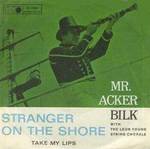
"Stranger on the Shore" is a piece for clarinet written by Acker Bilk for his young daughter and originally named "Jenny" after her. The tune was written on a single scrap of paper by Bilk and handed over to arranger Leon Young who crafted the string arrangement, including the characteristic harmonic shifts at the very end.
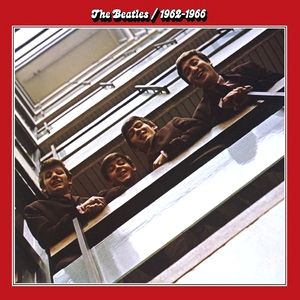
1962–1966, also known as the Red Album, is a compilation album of songs by the English rock band the Beatles, spanning the years indicated in the title. Released with its counterpart 1967–1970 in 1973, the double LP peaked at number 3 in the United Kingdom. In the United States, it topped the Cash Box albums chart and peaked at number 3 on the Billboard Top LPs & Tape chart while 1967–1970 reached the top spot. The album was re-released in September 1993 on compact disc, charting at number 3 in the UK.

Diane Eve Warren is an American songwriter. She has won an Academy Honorary Award, Grammy Award, an Emmy Award, two Golden Globe Awards and three consecutive Billboard Music Awards for Songwriter of the Year from 1997 to 1999. She first gained recognition for her work on DeBarge's 1985 single "Rhythm of the Night". By the late 1980s, she joined the record label EMI, where she became the first songwriter in the history of Billboard magazine to have written seven hit songs, each recorded by different artists, prompting EMI's UK Chairman Peter Reichardt to call her "the most important songwriter in the world".
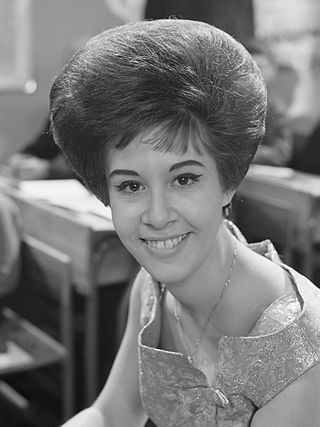
Helen Kate Shapiro is a British pop and jazz singer and actress. While still a teenager in the early 1960s, she was one of Britain's most successful female singers. With a voice described by AllMusic as possessing "the maturity and sensibilities of someone far beyond their teen years", Shapiro recorded two 1961 UK chart toppers, "You Don't Know" and "Walkin' Back to Happiness", when she was just 14 years old.

Norman William Paramor, known professionally as Norrie Paramor, was a British record producer, composer, arranger, pianist, bandleader, and orchestral conductor. He is best known for his work with Cliff Richard and the Shadows, both together and separately, steering their early careers and producing and arranging most of their material from the late 1950s to the early 1970s. Paramor was an orchestra conductor and composer of music for studio albums, theatrical productions, and film scores.

Danny Williams was a South African-born British pop singer who earned the nickname "Britain's Johnny Mathis", for his smooth and stylish way with a ballad. He is best known for his 1961 UK number one version of "Moon River" and his 1964 U.S. top ten hit, "White on White".
"Don't Let the Stars Get in Your Eyes" is a country song about a man away from home who is worried that his paramour may unwittingly stray from their relationship. It was written by Winston L. Moore and published in 1952. The song has been recorded in many different styles by many performers, with Perry Como's version hitting number 1 in both the US and UK.
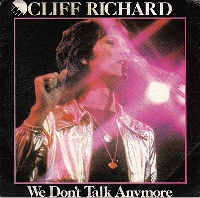
"We Don't Talk Anymore" is a song recorded by Cliff Richard, written by Alan Tarney and produced by the Shadows' rhythm guitarist, Bruce Welch. It was released in 1979 as a single and reached number one in the UK Singles Chart in August 1979, remaining there for four weeks, Richard's tenth UK number one and his first since "Congratulations" in 1968.

"Hey! Baby" is a song written by Margaret Cobb and Bruce Channel, first recorded at Clifford Herring Studios in Ft. Worth Tx, and recorded by Channel in 1961, first released on LeCam Records, a local Fort Worth, Texas label. After it hit, it was released on Smash Records for national distribution. Channel co-produced the song with Major Bill Smith and released it on Mercury Records' Smash label. It reached number 1 on the Billboard Hot 100 for three weeks, starting the week ending March 10, 1962.
"You Don't Have to Say You Love Me" is the English-language version of the 1965 Italian song ”Io che non vivo," written by Pino Donaggio and Vito Pallavicini. The English lyrics were written for Dusty Springfield by Vicki Wickham and Simon Napier-Bell.
"Walkin' Back to Happiness" is a 1961 single by Helen Shapiro. The song was written by John Schroeder and Mike Hawker. With backing orchestrations by Norrie Paramor, the song was released in the United Kingdom on the Columbia (EMI) label on 29 September 1961. It was number one in the UK for three weeks beginning 19 October, but only reached #100 on the US Billboard Hot 100, Shapiro's only US chart appearance. The single sold over a million copies and earned Helen Shapiro a golden disc.
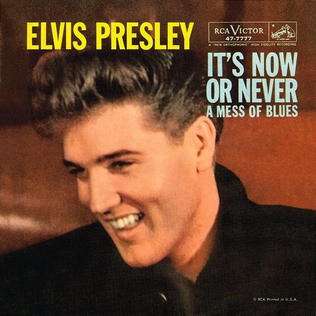
"It's Now or Never" is a song recorded by Elvis Presley and released as a single in 1960. The song is Presley's biggest hit, with 20 million copies sold worldwide, it is one of the best-selling singles of all time. It was recorded by Bill Porter at RCA Studio B in Nashville. It is written in E major and has a tempo of 80 BPM.
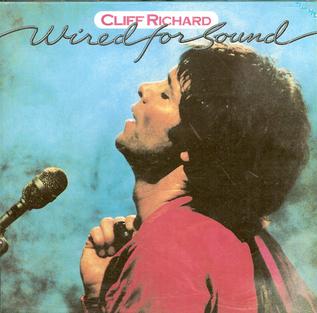
Wired for Sound is the 24th studio album by Cliff Richard, released in September 1981. The album peaked at number 4 in the UK album charts upon release, and spent a total of 25 weeks on the chart in 1981–82. The album was certified Platinum by the BPI, and achieved global sales of over one million.
"Don't Treat Me Like a Child" is the 1961 debut single of then fourteen-year-old Helen Shapiro, and was written by John Schroeder and Mike Hawker. The song was recorded at Abbey Road, with a nine piece band under the direction of Martin Slavin.
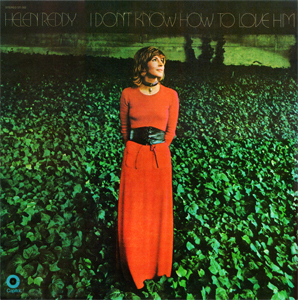
I Don't Know How to Love Him is the debut studio album by Australian-American pop singer Helen Reddy, released on May 10, 1971, by Capitol Records. I Don't Know How to Love Him included her first recording of "I Am Woman". The album made its first appearance on Billboard magazine's Top LP's chart in the issue dated June 5, 1971, and remained there for 37 weeks, peaking at number 100, and got as high as number 40 on the album chart in Canada's RPM magazine. On November 27, 1974, the album received Gold certification from the Recording Industry Association of America, and on March 29, 2005, it was released for the first time on compact disc as one of two albums on one CD, the other album being Reddy's eponymous follow-up that originally came out in the fall of 1971.

Long Hard Climb is the fourth studio album by Australian-American pop singer Helen Reddy, released on July 23, 1973, by Capitol Records and, aside from its primary focus on Top 40-friendly material, had her trying out New Orleans jazz and the English-language version of a recent Charles Aznavour standard. It debuted on Billboard's Top LP's & Tapes chart in the issue dated August 11, 1973, and reached number eight during its 43 weeks there, and in Canada's RPM magazine it peaked at number 14. On September 19 of that year, the Recording Industry Association of America awarded the album with Gold certification for sales of 500,000 copies in the United States. On July 22, 2003, it was released for the first time on compact disc as one of two albums on one CD, the other album being her 1972 release I Am Woman.
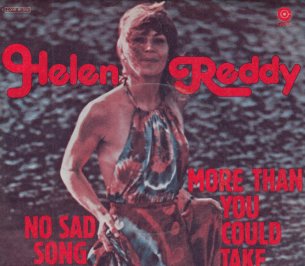
"No Sad Song" is a song written in 1971 by Carole King and Toni Stern. It was recorded by Australian singer-songwriter Helen Reddy, appearing on her album Helen Reddy, released in November 1971.

The singles discography of English singer Cliff Richard consists in excess of 200 singles, of which 159 singles have been released in the UK in varying vinyl, CD, cassette and digital formats. Listed alongside the UK singles in the discography below are a further 20 singles which were released in other territories, as well as 22 singles which were sung in German and only released in German-speaking countries.
References
- 1 2 3 Rice, Jo (1982). The Guinness Book of 500 Number One Hits (1st ed.). Enfield, Middlesex: Guinness Superlatives Ltd. p. 60. ISBN 0-85112-250-7.
- ↑ Billboard Magazine, Hits of the World, August, 1961. 7 August 1961.
- ↑ Billboard Magazine, Billboard Music Week, September 1961. 11 September 1961.
- ↑ Dowse, Tony (2011). The Ultimate Helen Shapiro. EMI Gold.
- ↑ Billboard Magazine, Hits of the World, October 1961. 9 October 1961.
- ↑ Billboard Magazine, Hits of the World, November 1961. 6 November 1961.
- ↑ Billboard Magazine, Hits of the World, October 1961 (PDF). 9 October 1961.
- ↑ Billboard Magazine, Hits of the World, November 1961. 20 November 1961.
- ↑ Billboard Magazine, Hits of the World, September 1961. 25 September 1961.
- ↑ Billboard Magazine, Hits of the World, February 1962. 10 February 1962.
- ↑ Billboard Magazine, Hits of the World, January 1962. 20 January 1962.
- ↑ Billboard Magazine, Hits of the World, March 1962. 10 March 1962.
- ↑ Billboard Magazine, Hits of the World, January 1962. 6 January 1962.
- ↑ Billboard Magazine, Billboard Music Week, November 1961. 20 November 1961.